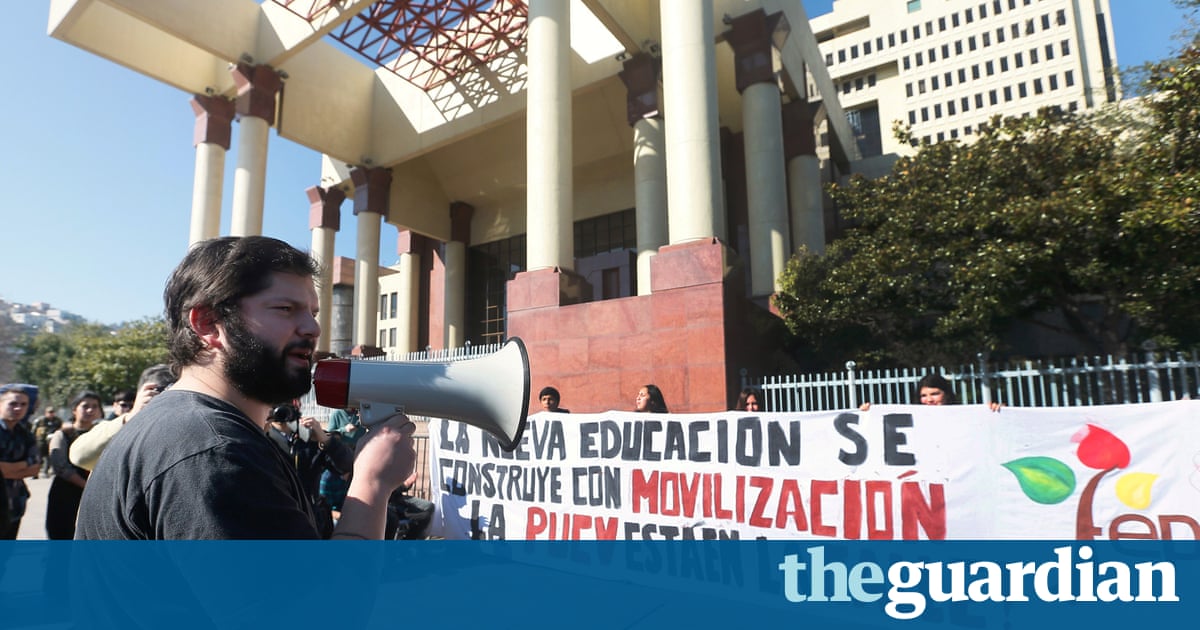Chile’s young independents lead quiet revolution against politics-as-usual

In the second city Valparaso, Jorge Sharp, a veteran of 2011 student protests, was chosen in a citizens primary to take on the traditional parties for the mayors job

Chiles second biggest city, Valparaso, is best known for its neighbourhoods of brightly coloured houses clinging to steep hillsides above the Pacific. Its historic centre is the countrys only UN world heritage site, but recent decades have not treated the city well: wildfires have devastated entire neighbourhoods; the citys streets are a wreck of potholes, garbage and the excrement of thousands of stray dogs.
Jorge Castro the incumbent mayor from the far-right Independent Democratic Union party has survived numerous corruption investigations and is running for re-election on Sunday.
But a quiet revolution is brewing in the city: fed up with the candidates from Chiles two main political coalitions, a group of citizens has launched a movement to bring one of their own to office.
And as traditional parties founder under the weight of a string of high-profile corruption scandals, a new generation of politicians across the country is aiming to capitalise on voter distrust in local elections this weekend.
In July, Valparaso held Chiles first ever citizens primary and thousands of voters chose as their candidate Jorge Sharp, a former leader of the student movement that lead national protests in 2011 for affordable education.
For the past five months, Sharp has worked the steep hills of Valparaso, hoping to capitalise on a rejection of politics-as-normal. Its not that people are avoiding politics, said Sharp, a 31-year-old lawyer. But people are definitely avoiding the political parties.
Sharp is the only one of the three leading mayoral candidates not backed by a traditional political coalition and while that may give him a disadvantage in terms of logistics, he sees it is a positive advantage in Chiles current climate of disillusionment.
Pedro Miranda, a 64-year-old Valparaso restaurant manager, said voters were looking for change: If we dont put new actors on the stage then definitely we are going to have the same, which is exactly what we dont want.
Voter disgust with traditional politicians has erupted over recent months. Halfway through her second term, President Michelle Bachelets approval rating is hovering around 25% well below the 71% she reached towards the end of her first term.
Bachelets approval ratings cratered last year after her son was accused of using his political connections to help his wife obtain a bank loan for a property deal.
Concurrently, a huge campaign finance scandal has tainted dozens of political leaders, many of whom were elected as socialists but were then discovered to have been funded with money from Soquimich, a publicly traded Chilean company run by the former son-in-law of the dictator Augusto Pinochet.
The rightwing UDI party has imploded under its own scandals: the partys former presidential candidate Laurence Golborne who as minister of public works led the 2010 rescue of 33 miners trapped in a copper mine is under house arrest while prosecutors investigate allegations of tax fraud and illegal campaign funding. The longtime UDI president Jovino Novoa was given a three-year prison sentence for illegal campaign contributions and banned from political office.
Turnout for the upcoming national elections is expected to set record lows with barely one in three eligible voters participating. We will have places where less than 30% will vote, predicted Marta Lagos, a sociologist and Chile director of Market Opinion Research International, a leading polling company.
With traditional parties mired in controversy and internal divisions, it is perhaps not surprising that voters should look for an alternative in the generation that came of age during the 2011 student protests.
Other former student leaders, Gabriel Boric, 29, and Giorgio Jackson, 30, are years away from the minimum legal age of 35 to run for president and are still in their first term in congress.
But they and their followers can mobilise a powerful voter bloc with which they hope to take control of cities including Antofogasta, Punta Arenas and Valparaso.
What is happening in Chile is happening in other countries in the world, particularly in Spain and England, said Sharp, who pointed to the rise of insurgent parties including Ukip and Podemos, and widespread disillusionment with traditional politics.
People dont trust or feel close to the large political coalitions and are looking for new alternatives. The economic and social models didnt bring the social wellbeing that was promised.